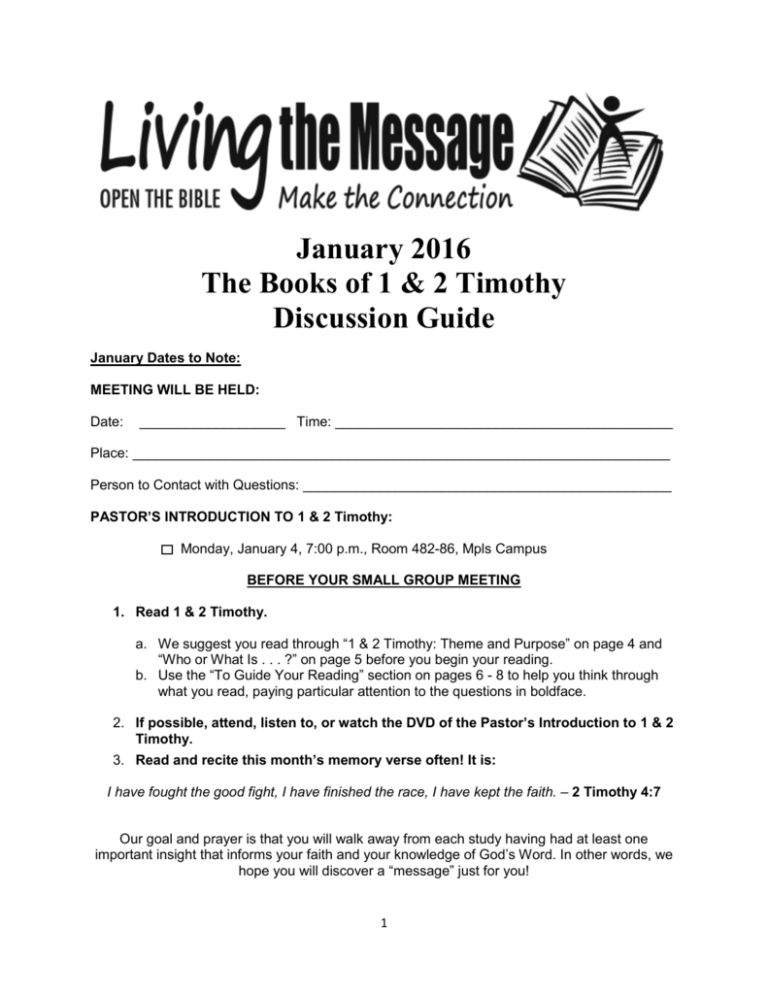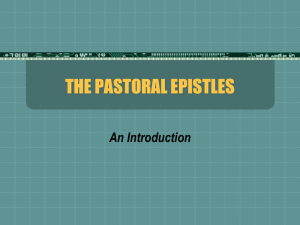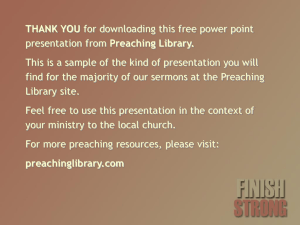1 & 2 Timothy January 2016 - Mount Olivet Lutheran Church
advertisement

January 2016 The Books of 1 & 2 Timothy Discussion Guide January Dates to Note: MEETING WILL BE HELD: Date: ___________________ Time: ____________________________________________ Place: ______________________________________________________________________ Person to Contact with Questions: ________________________________________________ PASTOR’S INTRODUCTION TO 1 & 2 Timothy: Monday, January 4, 7:00 p.m., Room 482-86, Mpls Campus BEFORE YOUR SMALL GROUP MEETING 1. Read 1 & 2 Timothy. a. We suggest you read through “1 & 2 Timothy: Theme and Purpose” on page 4 and “Who or What Is . . . ?” on page 5 before you begin your reading. b. Use the “To Guide Your Reading” section on pages 6 - 8 to help you think through what you read, paying particular attention to the questions in boldface. 2. If possible, attend, listen to, or watch the DVD of the Pastor’s Introduction to 1 & 2 Timothy. 3. Read and recite this month’s memory verse often! It is: I have fought the good fight, I have finished the race, I have kept the faith. – 2 Timothy 4:7 Our goal and prayer is that you will walk away from each study having had at least one important insight that informs your faith and your knowledge of God’s Word. In other words, we hope you will discover a “message” just for you! 1 AT YOUR SMALL GROUP MEETING Welcome Welcome to the January meeting of your Living the Message Bible discovery group. In order to keep to your agreed-upon time frame, place a clock where it is clearly visible or ask someone to be “timekeeper” and let the group know when 15 minutes remain for discussion and closing. Opening Prayer Pause to quiet your hearts and minds with a few moments of silent prayer. Then have someone open with his or her own prayer or pray the following together: Dear Lord, Enter our time together with the flaming light of your truth that we may discover in your Word your way for our lives and the freedom, grace, and peace of the gospel. In your precious name, Amen. This Month’s Memory Verse Recite this month’s memory verse (including the book, chapter, and verse) together as a group. I have fought the good fight, I have finished the race, I have kept the faith. – 2 Timothy 4:7 Getting Under Way Spend a moment in silence thinking about this month’s memory verse (above). If you drafted a spiritual “last will and testament” for your family and friends, what would you say? Setting the Scene Before beginning discussion, invite your small group facilitator and anyone else who attended, listened to, or saw the DVD of the Pastor’s introduction to 1 & 2 Timothy to share what they learned. Discuss Together Go to “To Guide Your Reading” on pages 6 – 8. Discuss together the questions in boldface and/or others of the questions that particularly struck members of your group. Remember, a good discussion on fewer questions is better than rushing through all the questions. If you wish, ask if any of the questions (boldface or not) were of particular interest to someone and begin there. Following your discussion, go to “For Next Month” on the next page for reminders about your next meeting and closing prayer. 2 FOR NEXT MONTH Our next meeting will be in February: Date: ___________________ Time: ____________________________________________ Place: ______________________________________________________________________ Person to Contact with Questions: ________________________________________________ February’s Reading Assignment: Forty in the Bible: More than a Number – The Appendix on pages 9 & 10 is a list of examples which use the number 40 in the Bible. Read through the list, and as time allows look some up some or all of these citations noting the context in which the number 40 appears. Jot down thoughts, patterns, and questions that occur regarding ways the number 40 is used. February’s Memory Verse: After his suffering, he presented himself alive to [the apostles] . . . appearing to them during forty days and speaking about the kingdom of God. – Acts 1:3 Save the date! Next Pastor’s Introductions: Monday, February 1, 7:00 p.m., Room 482-86, Minneapolis Campus CLOSING PRAYER Gather requests for prayers, encouraging both things for which God’s help and guidance is needed and things for which people are grateful. If someone is comfortable doing so, ask that person to pray aloud a prayer bringing these concerns to God, or take time for silent prayer during which these concerns can be brought to God. End with a prayer of your own, by reciting the Lord’s Prayer, or by praying the following together: Dear Lord, We need your guiding love as we fight the good fight, run the race, and keep the faith. We ask, the, that you would open our mouths so that we can talk to you and of you. Open our ears so we can hear you and the cries of those in need. Open our eyes so we can see you in the beauty of creation and the faces of those who are lit with your love. Open our hearts so that we can more fully love, thank, trust, and serve you. And teach us to pray that we may know your will and be strengthened for these and all things. In your precious name, Amen. FOLLOWING YOUR SMALL GROUP MEETING Ponder “The authority by which the Christian leader leads is not power but love, not force but example, not coercion but reasoned persuasion. Leaders have power, but power is safe only in the hands of those who humble themselves to serve.” – John Stott 3 1 & 2 Timothy Theme & Purpose First and Second Timothy, along with Titus, are each written from a pastor to a pastor and so are called the “pastoral epistles.” These “companion pieces” share much in terms of style and theological themes, though 2 Timothy differs from the other two in that it has nothing to say about ecclesiastical offices and begins with a section of thanksgiving and encouragement. The First Letter to Timothy letter is addressed to Timothy in Ephesus, who is serving as Paul’s appointed leader of the church there. Paul himself has departed for Macedonia. While he plans to return, he is concerned he may be delayed, and so sends instructions he expects to be carried out while he is away. Though addressed to Timothy, the letter sometimes addresses the larger community, encouraging them, for example, to honor elders who rule well, preach, and teach. In emphasizing the goodness of God and of the creation, this first letter also affirms that God not only created all things, but created them good (1 Tim 1:2; 2:5; 4:3-4; 2 Tim 1:2). There also is an emphasis on living in the world rather than fleeing from it. Much of the letter, however, contrasts true and false teachers and prescribes specific rules for how the church is to be ordered or governed. The much more intimate Second Letter to Timothy addresses Timothy as a “beloved child.” Written as Paul faces possible martyrdom in Rome, the letter offers what feels like last words of instruction. Believers are urged to not to be ashamed of the gospel and to stand firm even if that means suffering on its behalf. The picture of Paul that emerges is that of the ideal Christian and apostle who not only proclaims the gospel, but is willing to suffer for it. Paul’s suffering and willingness to die are lifted up not only as an example of his faithfulness, but as an argument that both Paul and the gospel are authentic, since it was commonly believed in early Christianity that false teachers would never endure such suffering. good order in the church. Common themes that emerge in both letters include the affirmation of Christ’s pre-existence and incarnation (1 Tim 3:16; 2 Tim 1:9-10); his true humanity (1 Tim 2:5; 6:13; 2 Tim 2:8); his certain death (1 Tim 2:6; 2 Tim 2:11); his ascension to heaven and reign in the present era (1 Tim 3:16; 2 Tim 1:10; 2:12); and his coming again (1Tim 6:14; 2 Tim 4:8). While there are special expectations for office holders in the church, there are general ethical teachings that apply to all believers. These include good works in general (1 Tim 2:10; 2 Tim 2:21; 3:17), moderation (1 Tim 6:8), generosity (1 Tim 6:17-18), and care of the elderly (1 Tim 5:4). The love of wealth is to be avoided (1 Tim 6:9-10; 2 Tim 3:2). Stress is placed on the goodness of marriage and having children (1 Tim 3:2-5; 5:10, 14) and the legitimacy of secular authority (1 Tim 2:1-2). Content on this page draws heavily from www.enterthebible.org’s summary and overview of 1 & 2 Timothy written by Dr. Arland Hultgren, Professor Emeritus and former Asher O. and Carrie Nasby Chair of New Testament, Luther Seminary, and is used with permission. 4 Who or What Is . . . ? Ephesus. This wealthy port city located on west coast of Asia Minor (modern day Turkey). Most of its half million inhabitants worshipped the goddess Artemis (Diana), whose temple in Ephesus was at the time one of the seven wonders of the ancient world. Ephesus also was home to Hellenistic mystery religions, as well as the residence of many Jews. Each of these exerted its influence on the religious climate in the city, making the young Christian church there subject to the winds of heresy from both Judaism on the one hand and the Hellenistic mystery religions on the other. Not surprisingly, then, the need to correct false teachings was a frequent problem for the church to survive intact. Acts 19 tells the story of Paul's two-year ministry founding the church in Ephesus, probably about 53-54 AD. The city was so important to Paul and early Christianity that it was the recipient of four letters that exist today: Ephesians, 1 Timothy, 1 John, and Revelation. Salvation. “Sin” comes from serving the self and its passions (2 Timothy 3:2-6), which leads away from eternal life and toward judgment and eternal death (1 Tim 5:22, 24). Salvation is the divine rescue of persons from mortality for life in the eternal and heavenly kingdom of God (2 Tim 1:10; 4:18). Such salvation is possible only through Christ, who gave himself as a ransom for all =, thereby bearing the divine judgment against sins for the benefit of others. Being raised from death, he “abolished death and brought life and immortality to light” (1 Tim 2:6; 2 Tim 1:10). Office bearers in the church. The terms “bishop,” “deacon,” “women,” “widow,” and “elder” appear in 1 Timothy (3:1, 8, 11; 5:3, 17, and elsewhere). The offices of bishop, deacon, and elder, appear to be fixed offices in the church at the time of the letter's composition. Their interrelationships and functions are not clear, however, nor is it clear whether or not the women mentioned are counted among the deacons, even though they appear to carry on diaconal work. There is a roster of widows who receive financial support. But whether one can speak of an "order of widows" (as did some Christian writers in the second century) is not clear. Slavery. The author takes it for granted that some Christians are slaves and that some Christians are slave owners (1 Tim 6:1-2). He assumes that slavery may be preserved. Slaves and slave owners are exhorted to be respectful of one other. Paul, then, is simply dealing with what was a reality at the time; he was not arguing in support of slavery as an institution. Timothy. The name means “honoring God” or “venerating God.” The son of a Jewish mother and a Greek, unbelieving father, Timothy lived in the city of Lystra. On Paul's first missionary journey to this city, Timothy, his mother Eunice, and grandmother Lois become believers (Acts 14:8-20; 2 Tim 1:5). Visiting Lystra on his second missionary journey (Acts 16:1-5), Paul recognized Timothy’s great spiritual growth and took him as his companion and assistant on his missionary journeys. Women in the church. 1 Timothy 2:11-14 exhorts women to remain silent in church, refrain from teaching, and not assume authority over men. While on one hand this is fitting with the general place of women in the ancient world, Paul’s writings are not consistent on this subject. In Ephesians 4:11, for example, Paul praises the work of Euodia and Syntyche, who like Timothy worked at Paul’s side for the cause of the gospel. Paul also commends Phoebe, who in Romans 16:1-2, he describes as a deaconess. It may be that the comments were prompted by Paul having heard that certain women had begun teaching a false version of Christian faith. Here and elsewhere, it is good to follow theologian Arland Hultgren’s suggestion of asking “what is fitting for the proclamation of the gospel and the ordering of the church in one’s own time and place.” Content on this page draws heavily from www.enterthebible.org’s summary and overview of 1 & 2 Timothy written by Dr. Arland Hultgren, Professor Emeritus and former Asher O. and Carrie Nasby Chair of New Testament, Luther Seminary, and is used with permission. 5 To Guide Your Reading Use the following questions to guide your reading and personal reflection, jotting down your thoughts in the space between each question. For those who wish, we have suggested a three-week schedule to help you in your reading and reflection. Questions in boldface are the ones we suggest you consider at your small group meeting. Groups are free, however, to focus on whatever questions are of most interest and concern to the group. Let the Spirit lead! WEEK 1 – 1 TIMOTHY 1 – 3 1. Paul affirms, “Without any doubt, the mystery of our religion is great…” (3: 16). Is the mystery and message of our (Christian) religion sufficient and compelling enough today to compete against extremists claims justifying terrorism and Jihad as obedience to Allah? 2. 1 Timothy 3:1-13 sets down the qualities one must have in order to serve as a bishop or deacon in the early church. What qualities do you feel are of most importance for those in leadership of the church today? 3. In 1:13-16, Paul reminds Timothy that he himself was a sinner until God grabbed his attention and granted him mercy so that “in me, as the foremost, Jesus Christ might display the utmost patience, making me an example to those who would come to believe in him for eternal life.” Share a time when: a. God got your attention OR b. God demonstrated patience with you OR c. God provided opportunity for you to share the gospel 6 WEEK 2 – 1 TIMOTHY 4 – 6 1. 1 Timothy 4:10 says that God is “the savior of all people, especially of those who believe.” What do you understand this to mean? 2. Paul encourages Timothy to not neglect his gifts and to maintain the spiritual disciplines that would strengthen his faith and allow the fruits of the Spirit within him to be visible to others (1 Tim 4:14-16). It is a conscious choice to open ourselves to God’s efforts to strengthen our faith. You have made such a choice by being involved in Living the Message. What other choices have you made in this regard (A few possible examples: Daily devotions, Bible study, regular prayer, attending worship, Christian service) What part can you plan in encouraging others to make similar choices in their walk of faith? 3. Similarly, consider the statements in 1 Timothy 6:13, 17 that God “gives life to all things” and “richly provides us with everything for our enjoyment.” Knowing there are faithful Christians who greatly suffer in any number of ways, what do you think Paul means in saying this? 7 WEEK 3 – 2 TIMOTHY 1 – 4 1. The first chapter of 2 Timothy is particularly poignant. In the face of suffering and death, Paul expresses gratitude and deep faith, while at the same time encouraging Timothy in the ministry with which he has now been entrusted. Which statements of Paul’s, in this chapter or elsewhere in 2 Timothy, are particularly meaningful to you and why? 2. 2 Timothy 1:14 reads: Guard the good treasure entrusted to you, with the help of the Holy Spirit living in us.” Throughout the centuries, Christians have both guarded and passed on the treasure of the gospel. Who are some of the people who have helped you in your faith journey and/or provided examples of the value of Christian faith and trust? What example and strengths do you hope to pass down to children in your personal or Christian family? 3. Based on what you have read in 1 & 2 Timothy, how would you say Paul would define a life well-lived? How would you define it? 8 APPENDIX The number forty is significant in the Bible because: Of the frequency of its use (approximately 150 times throughout both Testaments) It is the traditional Hebrew number signifying o The duration of a time of trial, preparation, probation, or consecration, or when times are hard and a person’s faith is tested (this often is followed by blessing) o Completion, fulfillment o A spiritual truth o A generation Examples include: Genesis 7:4, 12, 17; 8:6 The rain fell 40 days and nights during the great flood; after the water receded, Noah waited 40 days to open the Ark Genesis 25:20 Isaac was 40 years old when he married Rebekah Acts 7:30 Moses in Midian 40 years before his return to Egypt Deuteronomy 1:3; 34:7; Exodus 16:35 The Hebrews ate manna for 40 years in the wilderness Exodus 24:18 Moses was on Mount Sinai to receive the Law the first time for 40 days Exodus 34:28 Because of the peoples’ sins in his absence, including making a golden calf, Moses again spends 40 days on the mountain with God interceding for Israel & again receives the Law Leviticus 12:1-4 Hebrew/Israelite male infants were dedicated to God 40 days after birth Numbers 13:25 Spies scouted the land of Canaan for 40 days Numbers 14:33; Deut 1:1-3; 8:2 Israel spent 40 years in the wilderness before camping by the Jordan River Joshua 14:7 Caleb was 40 years old when Moses sent him to investigate Canaan Deuteronomy 34:7 Moses led the Hebrews out of Egypt at age 80 (2 x 40) and after 40 years in the wilderness died at age 120 (40 x 3) Judges 3:11; 5:31; 8:28 Three times God heard the peoples’ cries, sent a deliverer, and then allowed peace (the land to rest) for 40 years Judges 13:1 Because of the peoples’ sin, God gave them to an enemy for 40 years 1 Samuel 4:18 Eli judged Israel for 40 years 1 Samuel 17:16 Goliath taunted Israel 40 days 2 Samuel 5:4; 1 Kings 2:11 David reigned as King of Israel for 40 years 1 Kings 11:42; 2 Chronicles 9:30 Solomon reigned as King of Israel for 40 years 2 Kings 12:1 Jehoash reigned 40 years in Jerusalem 1 Kings 19:5-8 One meal from the angels gave Elijah the strength to travel 40 days and nights to Mount Horeb/Sinai in search of God 9 2 Kings 12:2 Ezekiel 4:6 Josiah reigned in Judah for 40 years Ezekiel lay on his right side 40 days and nights to symbolize the 40 years of Judah’s transgressions Exodus 29:11-13 Ezekiel prophesied 40 years of judgment for Egypt Luke 2:22-24 40 days after Jesus’ birth, Mary and Joseph took him to the Temple to complete Mary’s purification and dedicate Jesus to God Matthew 4:2; Mark 1:13; Luke 4:2 Jesus fasted for 40 days in the wilderness, tempted by the devil Acts 1:3 Jesus taught his disciples for 40 days following his Resurrection; on the fortieth day, he ascended to the Father. Jonah 3:4 God gave Nineveh 40 days to repent Genesis 50:3 Embalming took 40 days in early Bible times Deuteronomy 25:3 40 stripes was the maximum whipping penalty 1 Kings 6:17 The holy place of the temple was 40 cubits long 1 Kings 7:38 The size of the lavers in the Temple was 40 baths 10 11








